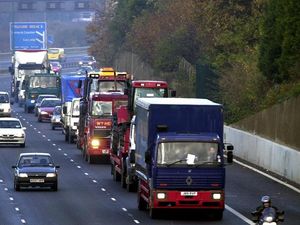Food industry wants no-deal Brexit competition waiver
The closeness of Christmas makes October 31 ‘the worst day you can pick’ to leave the EU, one retailer has said.

The UK food industry wants aspects of competition law to be set aside to allow firms to co-ordinate and direct supplies with each other in the event of a no-deal Brexit.
Doing so is illegal, as the law stands, and companies engaging in such practices risk being fined by the Competition and Markets Authority.
The Food and Drink Federation (FDF) said: “We asked for these reassurances at the end of last year, but we’re still waiting.”
The industry says that, because of stockpiling for Christmas, leaving the EU in the autumn could pose more difficulties than the original Brexit date last March.
One retailer told the BBC that October 31 “is about the worst day you can pick”, as warehouse capacity is at 105% in November, versus 75%-80% in March.
The UK would reportedly need 30 huge empty warehouses to store even a week’s extra food supply.
“In the event of no-deal disruption, if the Government wants the food supply chain to work together to tackle likely shortages – to decide where to prioritise shipments – they will have to provide cast-iron written reassurances that competition law will not be strictly applied to those discussions,” FDF’s chief operating officer Tim Rycroft told the BBC.
Another retailer said: “At the extreme, people like me and people from government will have to decide where lorries go to keep food supply chains going. And in that scenario we’d have to work with competitors, and the Government would have to suspend competition laws.”
The FDF has a list of 40 questions for the Government on its website, divided into areas such as transports and logistics, imports, exports and financial consequences.
Crossbench peer Lord Haskins, a former chairman of Northern Foods, said he believed there could be “panic-buying” in the event of a no-deal Brexit.
He also told BBC Radio 4’s Today programme: “We could be in a sort of wartime situation of a limited amount of food rationing.
“Those who can remember the war, that took a long time to put into place and it was pretty haphazard and pretty unfair.
“I don’t think we’ll get to that, but I’m very concerned about the groups who aren’t in the supermarket chain, how they will deal with things.”





